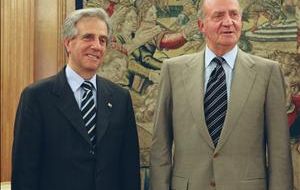MercoPress. South Atlantic News Agency
Vazquez skeptical about solution to Botnia mill dispute
 Full smiles for the official photo of President Vazquez and King Juan Carlos
Full smiles for the official photo of President Vazquez and King Juan Carlos Uruguayan president Tabare Vazquez said that the Botnia pulp mill will be authorized to begin production next week, no matter what happens in the coming Ibero-American summit in Chile. The Finnish built plant is at the heart of an acrimonious dispute between Uruguay and Argentina.
Before leaving early Wednesday for Santiago, Vazquez said the Uruguayan government was not expecting any special announcements regarding the possibility of an understanding over the three year long conflict with Argentina that objects the Botnia plant on legal and environmental issues. "The information we have so far is that the technical staff from both countries have had few meetings. Maybe a major meeting could be in the making. But we are not very hopeful about advancing towards a solution of the dispute; the solution will be whatever The Hague (International Court) rules", said Vazquez. The Uruguayan president insisted that no negotiation or agreement will be signed as long as the bridges leading to Uruguay remain blocked by pickets from Gualeguaychu, the Argentine city across the shared River Uruguay, where Botnia recently completed the mounting of pulp mill expected to have an annual production of a million tons. "This is an indispensable condition" since the "only proved illegality in this conflict is the blocking of routes leading to the bridges". Pickets from Gualeguaychu, originally sponsored by the Kirchner administration, continue to block access to the international bridge linking with Uruguay, hampering trade and tourism, alleging the Botnia pulp plant will contaminate, no matter what precautions are taken, ruining the local environment. Argentina took the case to the International Court of The Hague complaining Uruguay ignored a 1975 joint agreement for the administration of the shared River Uruguay and its waters. Both the Argentine government and Gualeguaychu residents are demanding a relocation of the Botnia pulp mill. A year ago Argentina requested the King of Spain help find a way out to the conflict, Juan Carlos then embarked on a "dialogue facilitating" process which has held several trilateral meetings, political and technical, under the auspices of Spain's ambassador in the UN, but so far with no apparent advance. King Juan Carlos, Presidents Vazquez and Kirchner will be staying at the same hotel in Santiago, and informal talks could help. Originally there were expectations that a deal could be reached and a formal announcement made. But both sides have been reluctant and positions seem unmovable according to the latest statements collected by the press both in Montevideo and Buenos Aires. "The possibility of an agreement is considered remote". This week Uruguay on request from Spain, in the middle of the official announcement, postponed the opening of the Botnia plant. Furthermore Joaquin Morales Sola, probably the most prestigious and independent Argentine columnist in a pre-summit piece called on a gesture from Uruguayans and Argentines towards the King who is currently undergoing a "complicated political" situation questioned by nationalists and extreme right groups that are disappointed with the growing Spanish autonomy movement led by Basques and Catalans. Morales Solá said that slamming the door on the King would be debilitating for the Spanish monarch, who he recalls, was among the most persistent and effective sponsors in the eighties helping to bring and end to military dictatorships and a quick return to democracy in Latinamerica. Argentina also has an extra debt of gratitude with the King who was among the few world leaders that when Argentina defaulted, called on bankers, financial institutions and governments to be patient and give the country a chance to recover. The columnist finally points out that the King is not only the constitutionally head of state of Spain but a moral authority and reference for Latinamerica. At the most both sides could agree to continue the "dialogue" and the two presidents could officially hold a meeting leaving the hard core of the issue for The Hague Tribunal. Anyhow any further "dialogue" or "negotiation", will have to wait for after Cristina Fernandez de Kirchner takes office next December 10. And once she is firmly seated in Casa Rosada President Cristina Kirchner might adopt another attitude towards the pickets: not only did she win by almost 39% of the vote in Gualeguaychu, but an opinion poll contracted by the Argentine government showed that almost 70% of the local population was against blocking the bridges. The 70% is equivalent to the sum of votes from the three main candidates in the recent presidential campaign, Mrs. Kirchner, Elisa Carrio and Roberto Lavagna, all of which were offensively attacked by the picketers during the campaign.




Top Comments
Disclaimer & comment rulesCommenting for this story is now closed.
If you have a Facebook account, become a fan and comment on our Facebook Page!